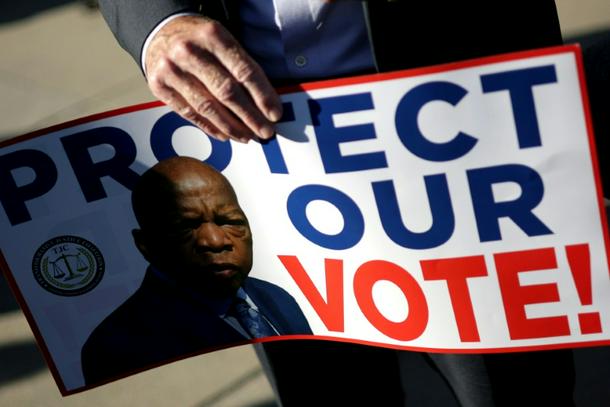
The Supreme Court is to rule on a challenge by white voters to a congressional map in Louisiana creating a second Black majority district
Washington (AFP) - The US Supreme Court appeared poised on Wednesday to restrict the use of race to draw electoral districts in a case that could cement Republican control over the House of Representatives – potentially even by next year’s crucial midterm vote.
During two-and-a-half hours of oral arguments, the court’s right-wing majority seemed inclined to gut a six-decades-old civil rights law designed to ensure Black representation in Congress.
African-Americans overwhelmingly vote Democratic and a ruling by the court neutering the 1965 Voting Rights Act could reorder the electoral map and give President Donald Trump’s Republicans a lasting structural advantage.
The case centers around a challenge to a congressional map adopted by the Louisiana state legislature creating a second Black majority district.
Blacks make up one-third of the population of Louisiana, which has six congressional districts.
But following the 2020 census, Louisiana created a new congressional map that included only one Black majority district instead of the previous two.
The Legal Defense Fund (LDF) and others filed suit claiming the new map diluted Black voting power and violated the Voting Rights Act, passed during the civil rights movement to remedy historic racial discrimination.
The Louisiana legislature released a new map last year with two Black majority districts that was met with a challenge from a group of “non African-American” voters.
Opponents of the redrawn map argue that using race to design congressional districts is unconstitutional racial gerrymandering.
Janai Nelson, an LDF attorney, noted that the Supreme Court had authorized race-based districting in the past to remedy discrimination, including with a 5-4 ruling in a recent Alabama case.
Refusing to do so now, Nelson told the court, would be “pretty catastrophic” and would constitute a “staggering reversal of precedent that would throw maps across the country into chaos.”
“We only have the diversity that we see across the South, for example, because of litigation that forced the creation of (minority) opportunity districts under the Voting Rights Act,” she said.
Benjamin Aguinaga, the Louisiana solicitor general, countered that “race-based redistricting is fundamentally contrary to our Constitution.”
“It requires striking enough members of the majority race to sufficiently diminish their voting strength, and it requires drawing in enough members of a minority race to sufficiently augment their voting strength,” Aguinaga said.
Justice Sonia Sotomayor, one of three liberals on the nine-member court, said no one is stopping the white plaintiffs in the case “from participating in the voting process.”
“No one is stopping them from trying to run candidates or support candidates that reflect their views,” Sotomayor said. “But the state is stopping Black voters from doing that in many districts because it’s packing them into areas where whites overwhelm them.”
- ‘One-party control’ -
Edward Greim, representing the white voters, questioned whether it is acceptable to create race-based districts “under our color blind constitution,” and even if so, “it was never intended to continue indefinitely.”
This argument appeared to strike a chord with Justice Brett Kavanaugh, a conservative who could prove to be the crucial swing vote.

A demonstrator holds a sign outside the Supreme Court during oral arguments in a pivotal voting rights case
The court has ruled in the past that “race-based remedies are permissible for a period of time,” Kavanaugh said, but they “should have an end point.”
A decision in the case is expected in June.
Republicans currently hold a slim majority in the House and an increase or decrease in the number of Black majority districts could help tip the balance in the midterms, when all 435 seats in the chamber will be up for grabs.
According to a report by voting advocacy groups Fair Fight Action and Black Voters Matter, a court ruling striking down voting protections for minorities could lead to Republicans picking up an additional 19 House seats.
“It’s enough to cement one-party control of the US House for at least a generation,” they said.
The Louisiana voting case is being heard against a backdrop of redistricting moves in both Republican- and Democratic-ruled states.
Republican-led Texas has drawn new congressional maps that could flip up to five House seats from Democrats to Republicans.
Democratic-ruled California has responded with a redistricting push of its own.